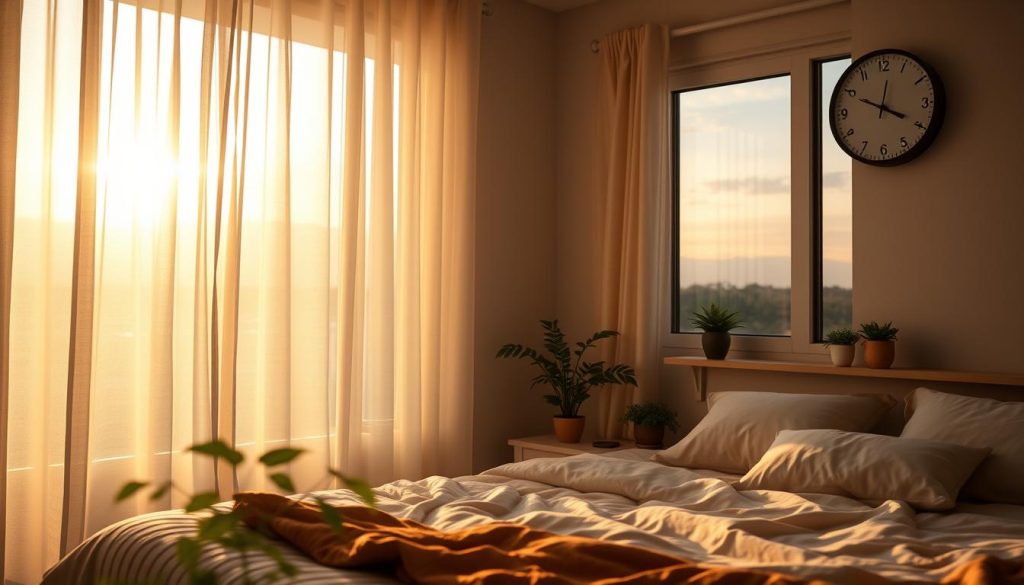Circadian rhythm disruption is a big problem today. Our body clock controls our sleep cycle. When it gets out of sync, it can harm our health. It’s key to find out why this happens and how to fix it.
Understanding how our lifestyle affects our body clock is the first step. This knowledge helps us find ways to improve our sleep. In this article, we’ll look at why a healthy circadian rhythm is important. We’ll also explore ways to get better sleep.
Understanding Circadian Rhythm and Its Importance
Learning about circadian rhythm helps us understand our daily body functions. It’s a 24-hour internal clock that controls many bodily processes. Keeping our sleep in sync with day and night is key for our health.
What is Circadian Rhythm?
Circadian rhythm is our body’s internal clock that affects sleep, hormone release, and more. It’s influenced by light and helps keep our body’s functions in rhythm. A well-set biological clock boosts mental clarity, emotional stability, and physical health.
The Role of the Body Clock in Health
A healthy body clock brings many benefits, like better metabolism and immune function. But, disruptions like irregular sleep or artificial light at night can harm us. Keeping our circadian rhythm in balance is crucial for fighting off illnesses and staying healthy long-term.

| Impact of Circadian Rhythm | Consequences of Disruption |
|---|---|
| Natural Sleep Cycle | Insomnia or Extreme Sleepiness |
| Regulated Hormone Levels | Hormonal Imbalance |
| Metabolic Efficiency | Increased Risk of Obesity |
| Mood Stability | Higher Levels of Anxiety and Depression |
Circadian Rhythm Disruption: Causes and Effects
Learning about the causes of circadian rhythm disruption helps us see how lifestyle choices affect our health. Many factors can disrupt our natural rhythms, leading to serious health issues. Let’s look at some common causes and their impact on our health.
Common Causes of Disruption
Several things can mess with our circadian rhythm, including:
- Irregular sleeping patterns, often from shift work or bad sleep habits.
- Too much artificial light, especially from screens at night.
- Eating too much or heavy meals before bed.
- Not enough physical activity, which can make sleep worse.
These choices often lead to sleep deprivation, making daily life harder.
Impact on Mental and Physical Well-being
The health effects of disrupted circadian rhythms are significant. Some common problems include:
- Insomnia, causing fatigue and mood swings.
- Anxiety, making us feel stressed and uneasy.
- A higher chance of chronic diseases like diabetes and heart problems.
It’s important to understand these effects to improve our health. Changing our lifestyle can help us sleep better and feel better overall.
| Cause | Effect on Health |
|---|---|
| Irregular Sleep Patterns | Increased sleep deprivation and fatigue |
| Excessive Artificial Light | Higher risk for insomnia and anxiety |
| Poor Diet | Possible links to chronic diseases |
| Lack of Exercise | Decreased sleep quality and mental health |
How to Identify Symptoms of Circadian Rhythm Disruption
It’s important to know the signs of circadian rhythm disruption. These signs can affect sleep and overall health. Recognizing them and knowing when to seek help is key.
Signs That Indicate Rhythmic Imbalance
Common signs of sleep disorder include:
- Difficulty waking in the morning
- Excessive daytime sleepiness
- Mood swings or increased irritability
- Disruptions in metabolism, such as changes in appetite
These symptoms can make daily life harder. Knowing them helps you improve your sleep.
When to Seek Medical Advice
Knowing when to see a doctor is crucial. Look for medical help if:
- Symptoms last a long time
- They affect your daily life
- You also have chronic fatigue or anxiety
Seeing a doctor early can help avoid bigger problems. It ensures you get the right treatment.

| Symptom | Description | When to Consult a Doctor |
|---|---|---|
| Difficulty waking | Struggling to get out of bed even after a full night’s sleep | If it continues for several weeks |
| Daytime sleepiness | Feeling excessively tired during the day | If it impairs daily activities |
| Mood swings | Frequent changes in emotional state, including irritability | If mood changes become severe or lead to isolation |
| Metabolism changes | Changes in appetite or weight that are not explained | If these changes are significant and persistent |
Practical Solutions for Circadian Rhythm Realignment
Fixing a disrupted circadian rhythm can greatly improve my health. Using practical tips for sleep and environment changes can significantly boost my nighttime sleep. Here are some effective ways to align my circadian rhythm.
Strategies to Adjust Your Sleep Schedule
Setting strict sleep and wake times is a key strategy. Sticking to a routine helps my body’s internal clock. Here are some important tips:
- Go to bed and wake up at the same time every day, even on weekends.
- Limit napping during the day, especially in the late afternoon.
- Gradually adjust my sleep time by 15-30 minutes if I need to shift my schedule.
- Consider natural light exposure in the morning to signal to my body that it’s time to wake up.
Environmental Changes for Better Sleep Quality
A calming environment is crucial for better sleep. Making specific changes can greatly improve my sleep. Here are some effective adjustments:
- Remove electronic devices from the bedroom to reduce distractions and blue light exposure.
- Use blackout curtains to block external light that may interrupt my sleep.
- Keep the room cool and comfortable to create a restful atmosphere.
- Incorporate soothing elements like white noise machines or calming scents.

| Method | Description | Benefits |
|---|---|---|
| Consistent Sleep Schedule | Going to bed and waking up at the same time daily. | Regulates the body’s internal clock. |
| Natural Light Exposure | Getting sunlight in the morning hours. | Helps signal wakefulness to the body. |
| Eliminate Electronics | Removing devices that emit blue light. | Reduces distractions and promotes relaxation. |
| Blackout Curtains | Using curtains to block outside light. | Enhances darkness for better sleep quality. |
| Cool Room Temperature | Setting the bedroom to a cooler climate. | Promotes comfort and sleep efficiency. |
The Role of Diet and Exercise in Circadian Rhythm
Looking into how diet affects our circadian rhythm shows its big impact on sleep and health. Eating the right foods and exercising at the same time every day help keep our body clocks in sync.
Foods That Support a Healthy Sleep Cycle
Eating the right foods can help us sleep better. Foods like:
- Whole grains
- Lean proteins
- Leafy greens
- Fruits, especially bananas and kiwis
- Foods high in melatonin, like cherries and walnuts
These foods promoting sleep help regulate our sleep cycles. Eating them regularly can make our nights more restful. A balanced diet with these nutrients can greatly improve our sleep quality.
The Importance of Regular Exercise Timing
Adding exercise for sleep to my day has been good. Working out in the morning or early afternoon helps me sleep better. But, exercising too late can make it hard to fall asleep.
So, timing is key. Scheduling workouts when my body is most active supports my diet and circadian rhythm.
Adopting Mindfulness Techniques and Their Benefits
Embracing mindfulness has changed how I handle daily stress and sleep. I use meditation, deep breathing, and yoga to find peace. These practices help me balance my body’s natural rhythm.
For example, meditation in the evening helps me relax. It quiets my mind and lowers my stress levels. This makes it easier to fall asleep.
| Mindfulness Technique | Benefits for Sleep | Stress Reduction Impact |
|---|---|---|
| Meditation | Improves sleep onset, increases sleep duration | Reduces anxiety, calms racing thoughts |
| Deep Breathing | Enhances relaxation response, decreases insomnia | Lowers heart rate, promotes a sense of calm |
| Yoga | Improves flexibility, aids in restful sleep | Releases physical tension, fosters emotional balance |
Adding these practices to my life has greatly improved my well-being. Mindfulness has brought balance to my body and improved my sleep and stress levels.
Final Thoughts on Circadian Rhythm Disruption
Reflecting on circadian rhythm disruption, it’s clear how crucial it is to tackle this issue. Effective solutions can change my sleep and health for the better. Every change I make helps my body and mind work in sync.
I’ve found ways to boost my energy and feel more alive. Adjusting my sleep and environment has made a big difference. Mindfulness has also helped me deal with stress and sleep better.
Understanding the value of sleep and health has given me the power to make better choices. By focusing on these areas, I’ve created a life that respects my body’s rhythm. This journey has brought me more energy and a deeper appreciation for life’s balance.

